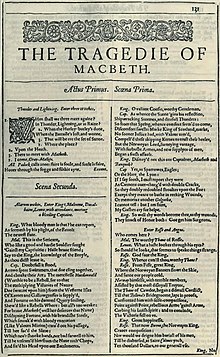
Macbeth Page 4
We found 233 free papers on Macbeth
Essay Examples
Overview
How male/female relationships are portrayed in Macbeth and poems
Macbeth
Poem
Relationship
Male/female relationships are portrayed differently in the poems ‘Porphyria’s Lover’, ‘Havisham’, ‘Cousin Kate’ and the play ‘Macbeth’. They all surround the themes of love, hate, jealousy, betrayal, guilt and obsession. However, the love versus hate theme is most dominant because all of the poems and the play have a melancholy mood, showing how the key…
Macbeth Motifs Research Paper Macbeth Motif
Macbeth
Macbeth Motifs Essay, Research Paper Macbeth Motif Essay William Shakespeare, in his tragic drama Macbeth, written in 1606, dramatizes the grim power of misrepresentation, insanity, and greed which finally consequences in the death of Macbeth. Macbeth allowed his desire to go male monarch overrule his opinion which consummately terminated his being. The drama is full…
Greed for Power and Wealth in Macbeth Analysis
Macbeth
Wealth
The play Macbeth, by William Shakespeare illustrates how greed for power and wealth can result in the destruction of oneself as well as others. The play’s central character, Macbeth is not happy as a high-ranking thane – leading him to assassinate Duncan to become King, while unknowingly dooming himself. Throughout the play many examples are…
How Does Shakespeare Retain a Degree of Sympathy for Macbeth? Analysis
Macbeth
William Shakespeare
How does Shakespeare retain a degree of sympathy for Macbeth through to the end of the play? “Not in the legions Of horrid hell can come a devil more damn’d In Evils to top Macbeth” If a play is to function as a tragedy, we, the audience, should feel a certain degree of sympathy for…
Macbeth’s Vaulting Ambition Analysis
Macbeth
Ambition can have both positive and negative effects. It can be a driving force that motivates individuals to make changes and achieve great things. However, when desires become overwhelming, they can lead to self-destruction. In William Shakespeare’s play “Macbeth,” the main character Macbeth falls victim to his own ambition. His downfall is a result of…
Elizabeth and darcy Macbeth and banquo
Macbeth
They both live equal lives because they are both thanes. I believe they have a great admiration for each other, particularly in terms of their strength and fighting abilities. Initially, when the witches made their predictions regarding Macbeth and Banquet, neither of them believed it. However, as the predictions began to come true one by…
Backstory on Lady Macbeth
Macbeth
There is not very much written about Lady Machete’s physical appearance. She seems to be portrayed as a very feminine looking, beautiful lady that has a very tough and harsh personality. Photos from films have often shown her as a beautiful, fair- skinned woman with red tinted hair. She was born as Grouch Engine Bolted…
Macbeth Is Guiltier Than Lady Macbeth Narrative Essay
Macbeth
Macbeth is a really exciting narrative incorporating all sorts of secret plans and slayings. The characters that are killing and are be aftering slayings are all really deceiving and unreliable. Two of the most unsafe felons in this drama are Macbeth and Lady Macbeth. Together they perpetrate the most awful slaying by killing the King;…
To What Extent is Macbeth Responsible for His Actions
Macbeth
To what extent is Macbeth responsible for his actions?Whose Fault Is It?In the play Macbeth, Macbeths actions are cold blooded and are done out of ambition and greed. For example, he killed King Duncan because he wanted to be the king of Scotland. He also hired murderers to kill Banquo and his son Fleance because…
William Shakespeare’s Macbeth and Othello
Macbeth
Othello
William Shakespeare
William Shakespeare’s Macbeth and Othello share themes that deal with the differentiation between appearances and truth. Main characters in both plays find themselves helplessly confused as their minds battle with their eyes to distinguish between what they see, and what is real.Iago and Lady Macbeth are two deceptive characters who appear to be noble and…
| originally published | 1606 |
|---|---|
| description | Macbeth is a tragedy by William Shakespeare; it is thought to have been first performed in 1606. It dramatises the damaging physical and psychological effects of political ambition on those who seek power for its own sake. |
| setting | Macbeth is set during the 11th century in Scotland, in the northernmost region of what is now the United Kingdom. ... Over the course of the play, Macbeth moves from his castle in Inverness to the royal palace in Dunsinane., |
| characters | Macbeth, Banquo, Lady Macbeth, Macduff, King Duncan, Three Witches, Malcolm |
| antagonist | Macduff |
| quotations | “By the pricking of my thumbs, something wicked this way comes.”“Infirm of purpose!”“More is thy due than more than all can pay.”“I have bought golden opinions from all sorts of people.”“The attempt and not the deed confounds us.” “Out damned spot!” |
| climax | CLIMAX · Macbeth's murder of Duncan in Act II represents the point of no return, after which Macbeth is forced to continue butchering his subjects to avoid the consequences of his crime. ... By that model, the climax of Macbeth is the fight between Macduff and the Scottish King., |
| information | Playwright: William Shakespeare Central theme: The main theme of Macbeth —the destruction wrought when ambition goes unchecked by moral constraints—finds its most powerful expression in the play’s two main characters. Macbeth is a courageous Scottish general who is not naturally inclined to commit evil deeds, yet he deeply desires power and advancement., |

